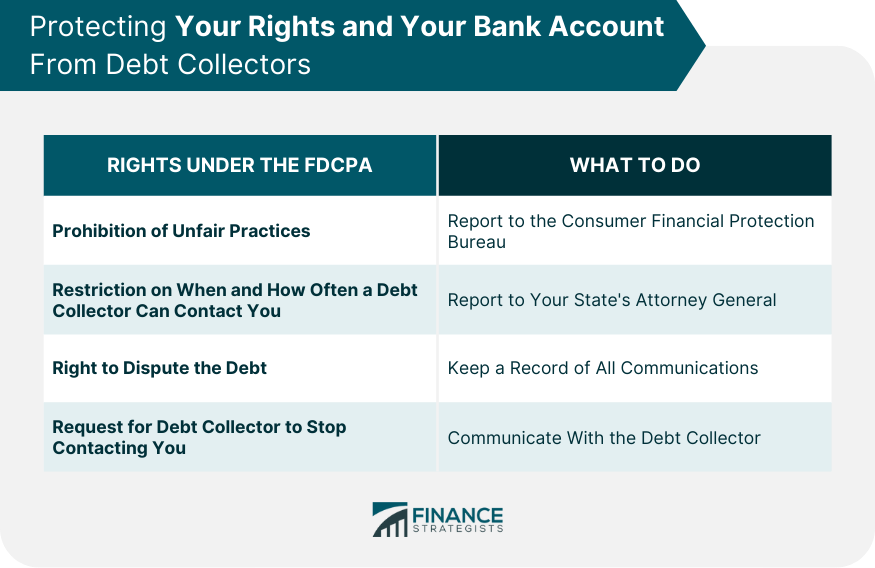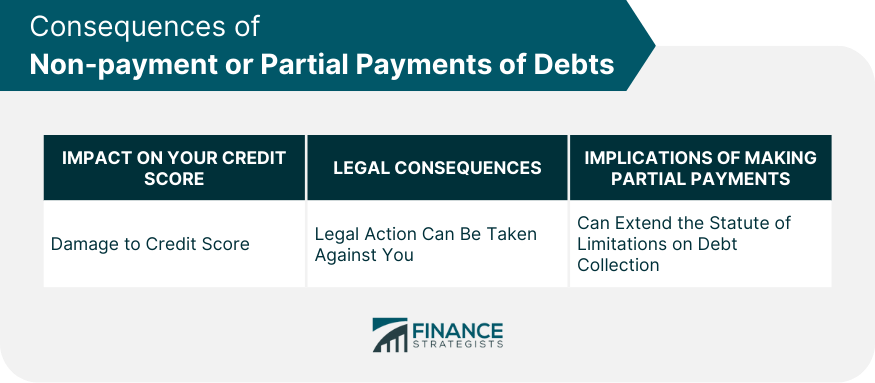The debt collection process is a system for creditors to recover overdue amounts from debtors, and it's vital for a functional credit system. However, it can cause stress and confusion for the indebted. If an original creditor, like a credit card company or bank, can't secure payment, they may employ a third-party collection agency or sell the debt to a debt buyer. Debt collectors, aiming to secure payment, contact debtors through various means, including phone calls, letters, emails, or even personal visits. They must adhere to rules outlined in the Fair Debt Collection Practices Act (FDCPA) which protects consumers. A common concern is whether debt collectors can access your bank account, emphasizing the importance of financial safety. The thought of a debt collector withdrawing money directly from your bank account can be unsettling. However, the general rule is that debt collectors, even with your details, cannot simply remove funds from your account without specific authorization. Typically, they require something known as a 'bank levy' to access your account. A bank levy is a legal action that allows creditors to take funds from your bank account. If you owe money to a person or company, they can obtain a court order demanding that your bank hand over funds from your account to pay the debt. It's also crucial to understand that bank levies are usually a last resort for debt collectors. Before they can use this drastic measure, they must first take you to court, win a judgment against you, and then use that judgment to demand your bank release the funds. All these steps provide opportunities for you to intervene and work out a repayment plan or challenge the debt. A court-ordered judgment is a decision issued by a court of law. In the context of debt collection, it means the court has formally decided you owe the money, and the creditor can take certain actions to collect it. Obtaining a judgment is a process that involves several steps. A creditor first needs to file a lawsuit in a suitable court. The court then sends you a notice that you've been sued. If you don't respond to this notice, the court can automatically rule in favor of the creditor. If you do respond, the matter will usually proceed to a hearing or trial, where the court will determine whether you owe the debt. If the court issues a judgment against you, it can have significant implications. A judgment allows a creditor to use a variety of means to collect the debt, including garnishing your wages, placing a lien on your property, and yes, levying your bank account. Even if you owe a debt, you still have rights. The Fair Debt Collection Practices Act (FDCPA) offers a variety of protections for consumers facing debt collection. Under the FDCPA, debt collectors are prohibited from using unfair practices when they collect debts. This includes actions such as trying to collect any interest or fee that is not included in your original contract, depositing a post-dated check prematurely, or threatening to seize your property unless they can do so legally. If you feel that a debt collector is treating you unfairly or violating these rules, you have the right to take action. If you believe that a debt collector has violated the rules of the FDCPA, you can report this to the Consumer Financial Protection Bureau (CFPB). The CFPB oversees the operations of debt collectors and can take enforcement action against those who break the law. The FDCPA places restrictions on when and how often a debt collector can contact you. They are not allowed to contact you at inconvenient times or places, such as before 8 a.m. or after 9 p.m., unless you agree. Debt collectors are also not allowed to contact you at work if they're told that you're not allowed to get calls there. If a debt collector violates these rules, you can file a complaint with your state's Attorney General's office. This office enforces state laws related to debt collection and can take action against collectors who violate these laws. They may also provide you with additional resources or refer you to a local consumer protection agency. The FDCPA provides consumers the right to dispute a debt. If you think you do not owe the debt, or the amount is incorrect, you can send a written letter to the debt collector disputing the debt or requesting verification of the debt within 30 days of first being contacted. Keeping a record of all communications with the debt collector is crucial when disputing a debt. This includes keeping copies of letters, notes of phone calls (including date, time, and what was discussed), and any other relevant information. These records can serve as evidence if you need to file a complaint or a lawsuit. If you wish for the debt collector to stop contacting you, you have the right to request this in writing. After the collector receives your letter, they are only allowed to contact you to confirm they will stop communication or to inform you about a specific action they intend to take. While it might feel intimidating, maintaining clear and documented communication with the debt collector can be beneficial. After sending your written request to cease contact, keep a copy for your records and send the letter by certified mail with return receipt requested. This provides proof that the debt collector received your letter. Note that stopping contact from a debt collector does Unpaid debts can harm your credit score, making it harder for you to borrow money in the future. The damage can last for several years, even if you eventually pay off the debt. In addition to harming your credit, unpaid debts can also result in legal action. As discussed earlier, a creditor can sue you, win a judgment, and then use that judgment to take money directly from your account or wage. It's also essential to know that making partial payments on a debt can restart the statute of limitations on debt collection in some states. This means you could potentially be liable for a debt longer than you would have been if you had made no payments at all. Before you engage in any repayment negotiations, first confirm that the debt is indeed yours and that the collection agency is legitimate. If the debt is yours, and you can't pay in full, consider negotiating a payment plan. Most debt collectors will be open to this approach, as they are more interested in recovering the money than taking you to court. Navigating debt collection can be challenging, and there's no shame in seeking help. Financial advisors and lawyers can provide you with guidance and can help you understand your rights and potential strategies. While the process of debt collection may seem daunting, understanding your rights and the regulations governing this field can empower you to navigate it effectively. Debt collectors, though persistent, cannot simply withdraw money from your account without a court-ordered bank levy, which is typically a last resort. The FDCPA provides protections for consumers, with avenues for recourse if these are violated. Remember, you have the right to dispute the debt, negotiate payment plans, and even seek professional assistance. Non-payment or partial payments of debts can have lasting implications on your credit score and legal standing, so it's crucial to be proactive in addressing debt issues. As a final point, financial well-being is a journey, and sometimes, professional advice can make all the difference. Consider reaching out to a trusted banking institution for financial services and guidance to secure your financial future.Understanding Debt Collection
Can Debt Collectors Withdraw Money Directly From Your Bank Account?
Role of Court Orders and Judgments in Debt Collection
How a Judgment is Obtained
Implications of a Judgment
Protecting Your Rights and Your Bank Account From Debt Collectors
Prohibition of Unfair Practices
Restriction on When and How Often a Debt Collector Can Contact You
Right to Dispute the Debt
Request for Debt Collector to Stop Contacting You

Consequences of Non-payment or Partial Payments of Debts
Impact on Your Credit Score
Legal Consequences
Partial Payments and Implications

Tips to Handle Debt Collectors and Safeguard Your Bank Account
Verify the Debt and the Collector
Negotiating Payment Plans
Seek Professional Help
Bottom Line
Can a Debt Collector Withdraw Money From Your Bank Account? FAQs
No, a debt collector can't withdraw money directly from your bank account without a court-ordered judgment or your permission.
A court-ordered judgment is a decision from a court that formally establishes you owe the debt, allowing the creditor to use various means to collect it.
The FDCPA protects you from unfair, deceptive, or abusive practices by debt collectors. It sets rules for when and how often a debt collector can contact you.
Non-payment can negatively impact your credit score and lead to legal action. Partial payment may extend the statute of limitations on debt collection.
You can verify the debt and the collector, negotiate payment plans, and seek professional help if needed. Remember, you have rights even when you owe a debt.
True Tamplin is a published author, public speaker, CEO of UpDigital, and founder of Finance Strategists.
True is a Certified Educator in Personal Finance (CEPF®), author of The Handy Financial Ratios Guide, a member of the Society for Advancing Business Editing and Writing, contributes to his financial education site, Finance Strategists, and has spoken to various financial communities such as the CFA Institute, as well as university students like his Alma mater, Biola University, where he received a bachelor of science in business and data analytics.
To learn more about True, visit his personal website or view his author profiles on Amazon, Nasdaq and Forbes.











